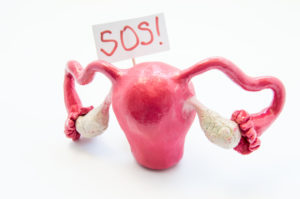
Black women have been faced with the very real danger of being diagnosed with uterine fibroids for many years now.
But experts are saying there’s little to fear now due to medical advancements.
"There are a number of excellent treatment options, as well as the option to do nothing at all where we take a “watch and wait” approach and monitor the growth closely, so there really is no reason to worry," says Julie Duff, a professor of Nursing at Resurrection University in Illinois.
Fibroids and Black Women
Fibroid tumors are made up of renegade muscle cells that come together to form a fibrous "knot" or "mass" in the uterus.
Fibroids most commonly occur between ages 30 and 40, with black women at greatest risk of contracting them.
To date, at least one genetic link has been identified, indicating that fibroids may be generationally transmitted.
For some women, fibroids cause no symptoms.
When they do, doctors say problems often involve heavy menstrual periods and prolonged bleeding. They can also cause pelvic or abdominal pain or swelling and increased urination.
It is a combination of your symptoms, the location of the fibroid, the amount and size, as well as your age and your childbearing potential, that help determine what your course of treatment should be.
There are Options
One option is a supracervical hysterectomy you remove only the uterine cavity holding the fibroids and leave the tubes, ovaries, cervix, vagina, or any of the support muscles in the bladder or pelvis," says Duff. This, she says, means you don't suffer any of the consequences linked to a traditional hysterectomy, including bladder and sexual dysfunction, or instant menopause.
Another non-invasive option is uterine artery embolization, in which the blood supply to the fibroid is cut off and is eventually removed after its death.
“This is a common technique we use for women who have not yet had children or wish to have future children,” says Duff. “We don’t want to disturb any of the reproductive organs if we don’t have to.
Recovery for both of these procedures is quick. It is also fast.
Most women are out of the hospital in two days and back to normal living within two weeks. It's also a permanent treatment for fibroids that can bring much-needed relief.
But, before you think about treatment, be sure you have uterine fibroids in the first place.
Here are some symptoms you should look out for:
1. Heavy menstrual bleeding
2. Menstrual periods lasting more than a week
3. Pelvic pressure or pain
4. Frequent urination
5. Difficulty emptying the bladder
6. Constipation
7. Backache or leg pains
8. Rarely, a fibroid can cause acute pain when it outgrows its blood supply and begins to die.
Fibroids are generally classified by their location.
Intramural fibroids grow within the muscular uterine wall. Submucosal fibroids bulge into the uterine cavity. Subserosal fibroids project to the outside of the uterus.
When to see a doctor
See your doctor if you have:
1. Pelvic pain that doesn't go away
2. Overly heavy, prolonged or painful periods
3. Spotting or bleeding between periods
4. Difficulty emptying your bladder
5. Unexplained low red blood cell count (anemia)
Seek prompt medical care if you have severe vaginal bleeding or sharp pelvic pain that comes on suddenly.
“Although we don’t know much about their origin, we do have effective ways to treat them,” Duff says. “You don’t have to suffer in silence.”








